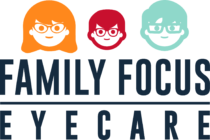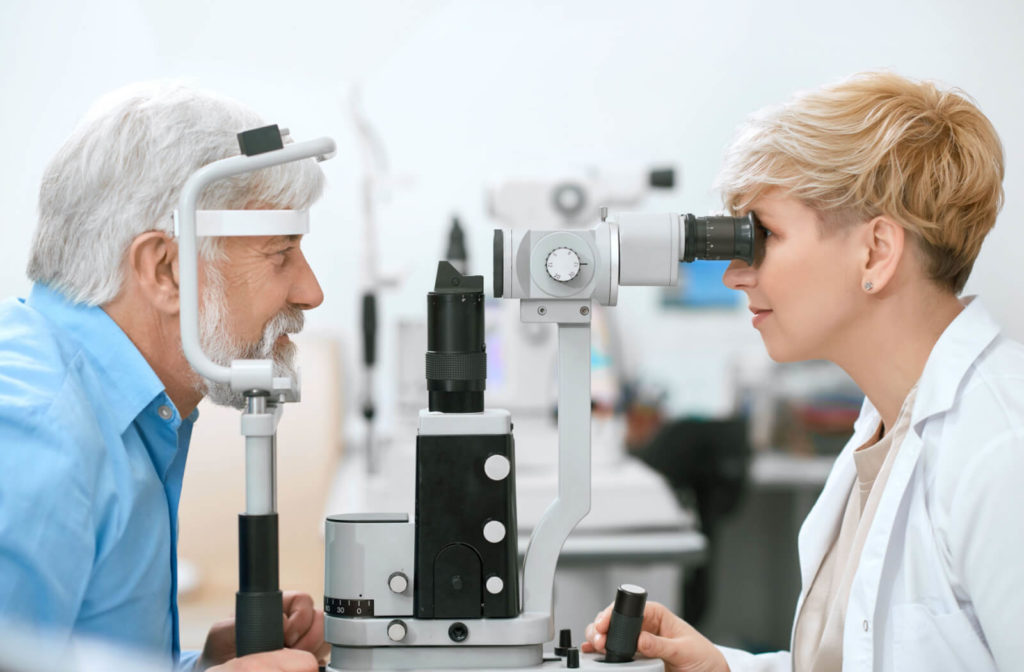An average eye exam can take between 30 and 60 minutes, but the time needed for your appointment can vary based on several factors, such as your eye health, overall health, and whether you’re going in for a routine checkup or to address a specific concern.
Your optometrist will perform a series of tests during a comprehensive eye exam to measure your vision and detect any problems affecting your overall eye health, and may provide more specific testing if you’re affected by other health conditions that can affect your eyes, such as diabetes.
What Is a Comprehensive Eye Exam?
A comprehensive eye exam is an in-depth evaluation of your eyes and vision performed by an optometrist. This type of exam includes a variety of tests and procedures to assess your visual acuity, eye health, and overall well-being.
A comprehensive eye exam typically involves collecting information about your medical history, measuring your vision, and conducting tests to evaluate your eye health.
What Are the Different Types of Eye Exams?
With various types of eye exams tailored to different age groups and specific needs, it’s important to know which exam is suitable for you or your family members.
Adult & Senior Eye Exams
An optometrist can often detect vision problems before you notice any changes to your eyesight. Adult and senior eye exams can help assess overall eye health and typically include tests for:
- Visual acuity
- Refraction
- Eye function
- Eye pressure
- Overall eye health
During your visit for a routine eye exam, we actively search for various vision problems that can affect your overall health.
We recommend yearly eye exams for adults. Annual eye exams can be especially important for seniors, as aging can be a factor for several conditions that can affect sight and cause blindness.
Children’s Eye Exams
Vision care is paramount for patients of all ages, including children—from infants to young adults. Proper vision helps children understand and respond to visual cues and is essential for learning and development. Optometrists can detect and treat many vision problems in children early on with comprehensive children’s eye exams.
Visual abilities begin in infancy, and kids’ eyes develop and change frequently throughout their school years. Children often have no way of knowing their vision is being affected by something, and they might be unable to express when something is wrong. However, there are telltale signs your child may need an eye exam, such as frequent squinting, headaches, or even sitting too close to screens.
The recommended frequency for comprehensive eye exams for children includes:
- One baseline exam between the ages of 6 and 12 months
- One comprehensive exam between the ages of 3 and 5 years
- Annual, comprehensive exams starting before 1st grade
Diabetic Eye Exams
People with diabetes can have a higher risk of developing serious eye conditions that can cause blindness if left untreated.
Diabetic eye exams are crucial for managing vision affected by diabetes and detecting ocular conditions that can be caused by diabetes, such as cataracts, glaucoma, diabetic retinopathy, and diabetic macular edema.
Early detection of eye problems is crucial for effective treatment and prevention of further complications. We recommend annual eye exams for patients with diabetes, but more frequent exams may be needed depending on your overall health and unique eye health.
Contact Lens Exams & Fittings
Contact lens exams and fittings are necessary for getting contacts that fit well and meet your vision needs.
During this type of exam, we will measure your eyes to determine the size and shape of the contact lenses that suit you. We may also ask you about your lifestyle, work environment, and daily activities to help determine the type of lens suitable for your individual needs.
Advanced diagnostic tools, such as corneal topography and meibography, may be used to diagnose any issues associated with contact lens wear, such as dry eye disease. These tests can help us match you with contact lenses that provide clear vision and fit well without causing other issues.
What Is Involved in an Eye Exam?
During an eye exam, we will typically perform several tests to evaluate your vision and eye health.
Some common tests include the following:
- Visual acuity tests: Visual acuity testing can help measure how clear your vision is and help us determine your unique needs for vision correction.
- Pupil dilation: Your optometrist may use special eye drops to dilate your pupils, allowing for a better view of the inside of your eyes.
- Eye alignment test: This test can help us check how well your eyes work together and can help detect issues such as strabismus or amblyopia.
- Retinal examination: We can examine the back of your eye, including the retina, optic nerve, and blood vessels, to detect any abnormalities or signs of disease.
What Is an Optometrist Looking For?
When we conduct a comprehensive eye exam, we are looking for any potential issues that could affect your vision and eye health, as well as other health problems that may be impacting your overall well-being.
Vision Problems
Optometrists assess your visual acuity to determine whether you have any refractive errors that may require corrective lenses. Common vision problems caused by refractive errors include myopia (nearsightedness) and hyperopia (farsightedness), astigmatism, and presbyopia (age-related difficulty in focusing).
Eye Health
A comprehensive eye exam can help us thoroughly evaluate your eye’s structures, such as your cornea, lens, retina, and optic nerve, to look for issues affecting your eye health. We can look for signs of eye diseases and conditions like glaucoma, cataracts, macular degeneration, retinal detachment, and diabetic retinopathy.
Eye Coordination & Muscle Function
We can also examine how well a person’s eyes work together and check for issues like strabismus (misaligned eyes) and amblyopia (lazy eye). An example of this type of testing could be an evaluation of your eye muscle function to confirm your eyes can move smoothly and accurately in all directions.
General Health
Eye exams can often reveal signs of general health issues unrelated to your vision. For example, an optometrist may detect signs of high blood pressure, diabetes, or autoimmune disorders through changes in your eye’s blood vessels or other structures.
Preparing for an Eye Exam
To prepare for your eye exam, gather any relevant information about your medical history, family history of eye conditions, and a list of current medications.
If you wear glasses or contacts, bring them to the appointment. You’ll also want to be prepared to discuss any symptoms or concerns you may have about your vision or eye health.
How Long Does an Eye Exam Take?
The duration of an eye exam depends on the type of exam you’re having and the specific tests involved. On average, a routine eye exam takes between 30 and 60 minutes. However, specialized exams, such as diabetic eye exams or contact lens fittings, may take longer due to the additional tests required.
Your eye exam length can also be influenced by factors such as your age, medical history, and whether you’re experiencing any particular symptoms or concerns.
It’s essential to allocate enough time for your eye exam so that you can get a thorough evaluation of your vision and eye health.
Trust Family Focus Eyecare for Your Eye Exams
At Family Focus Eyecare, we care about your family’s eyesight. Our experienced team of optometrists are dedicated to providing efficient, effective, friendly, and fun service.
We offer comprehensive eye exams for patients aged 6 months to 106 years old (and over!), and we strive to create long-lasting connections while providing vision correction that suits your personality, style, and needs.
Call us or visit us online to book your next appointment.



